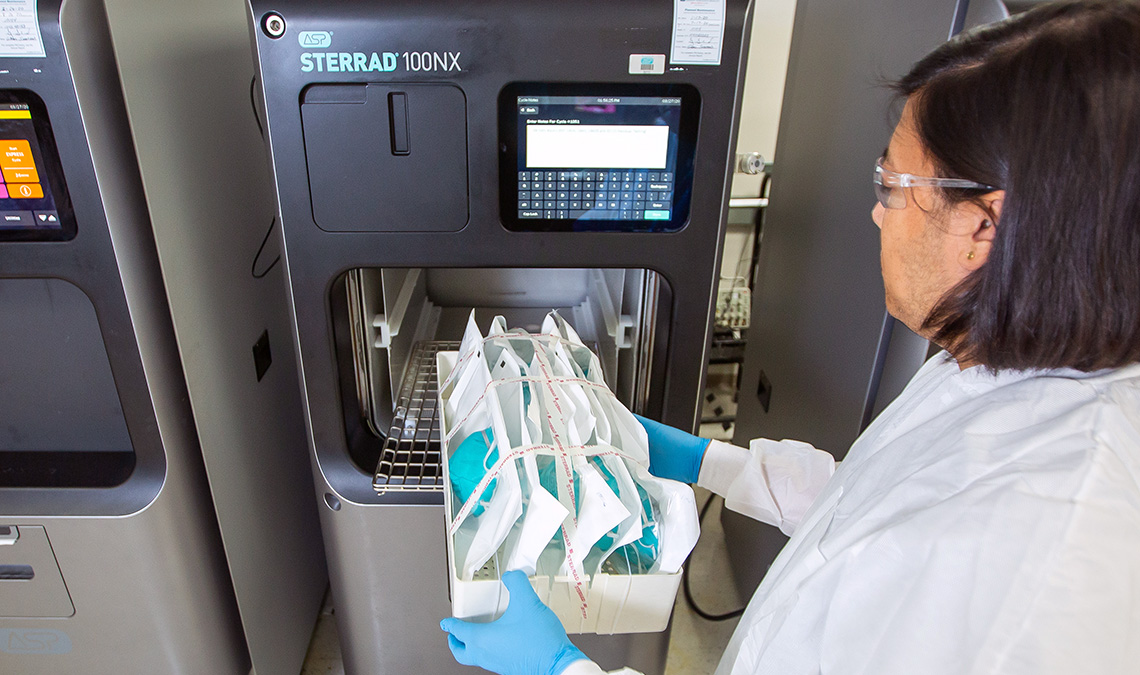Fortive protects healthcare workers taking on COVID-19

Led by Kellogg alumni including CEO Jim Lico '97, Fortive — a diversified industrial technology company — saw its operating companies step up to save lives during the COVID-19 pandemic
What can normally take up to a year, Advanced Sterilization Products accomplished in two weeks.
Working with the U.S. Food and Drug Administration to receive product approvals typically requires months of preparation, but in the face of an unprecedented global pandemic, members of ASP, a subsidiary in Fortive’s growing healthcare portfolio, and the FDA worked together for days into the wee hours of the morning to rapidly test and complete an Emergency Use Authorization to decontaminate N95 masks amidst a worldwide shortage of personal protective equipment for healthcare professionals.
“The core of what we wake up to do every day is around infection prevention to give patients the best possible outcomes in every condition, but of course, we’re being faced with hospital staff now having exposure because of the fact they had to reuse PPE,” said Dominic Ivankovich ’03, president at ASP. “PPE isn’t even designed to be reused. It’s all designed to be disposed of.”
In February, the ASP team decided to start conducting tests on N95 masks to see if they could develop a decontamination procedure, and within five days, the company felt positive about initial progress and started reaching out to external manufacturers around the world to test a wide range of masks.
To kill bacteria and viruses in the decontamination process, heat and chemical processes are required, making it challenging to keep the masks intact. “The process of decontaminating a mask is not trivial. You have to do it where you don’t break down the fibers in the mask, and you don’t change the shape of the mask because these are all potentially fitted units,” Ivankovich said.
Over the course of two weeks working with the FDA, ASP conducted significant amounts of testing and validation to ultimately be able to produce FDA-approved equipment with instructions for use that would allow healthcare workers in hospitals to safely decontaminate their N95 masks. ASP, as the largest provider of low-temperature sterilization equipment in hospitals around the world, works with more than 5,000 hospitals in the U.S. and more abroad, all of which now have access to the decontamination technology.
“For hospitals to have the opportunity to decontaminate their masks with the equipment and workflows they already own is just a tremendously important service and capability we could bring to them,” Ivankovich said.
ASP is not the only company operated by Fortive that stepped up to support essential technology during the COVID-19 pandemic. For example, Fluke, a leader in the manufacturing, distribution and service of electronic test tools and software, worked to keep the electrical grid up and running during the pandemic, which in turn, supported hospitals utilizing ventilators for COVID-19 patients. The company also used one of its plastics facilities to start making shields for healthcare workers, provided free of charge.
“I think each of us have had these nights where we woke up in the middle of the night and thought there has to be something we can do because we can’t have the heroes that are trying to save everybody in harm’s way,” said Barbara Hulit ’91, senior vice president at Fortive.
“Other Fortive companies that performed essential functions to respond to the COVID-19 pandemic include Gilbarco Veeder-Root, which delivers integrated solutions that power convenience stores and gas stations worldwide. By keeping gas stations operational during the crisis, frontline workers were able to get to their essential jobs and deliver supplies.
Gems Sensors and Controls, a global manufacturer of engineered products including liquid level sensors, flow switches, pressure switches and more, creates a critical technology in ventilators and drastically increased production to ensure ventilators could be accessed during times of need.
Setra Systems, a designer and manufacturer of pressure, acceleration and weight-sensing devices, conducts air quality monitoring in critical care situations, and they created in a battery-operated kit that can be used in field sites to monitor the air quality of places like intensive care units or isolation rooms.
“What impressed me the most during all this is the creativity and the ingenuity that our people showed when they were going through this time, and I don’t think any of us were prepared for such a thing,” Hulit said. “I loved seeing our continuous improvement mindset and commitment to the Fortive Business System come to life in such a powerful way.”
Hulit and Ivankovich are among a handful of Kellogg alumni who work at Fortive, including CEO Jim Lico ’97. This summer the company will welcome additional Kellogg interns to join their General Management Development Intern Program, which they restructured to be 100% virtual as a result of the pandemic.
“Kellogg really embodies creative problem solving, listening, learning and collaboration,” Lico said. “Certainly, those are all aspects that have been critical to our culture of innovation, and all the more as we build our company for success through COVID-19 and beyond.
